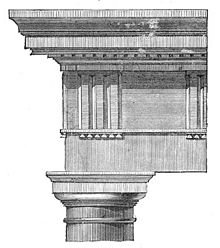

In classical architecture, a taenia (Latin: taenia, from Ancient Greek ταινία (tainía) 'band, ribbon') is a small "fillet" molding near the top of the architrave in a Doric column.[1] The entire structure above the columns is called the entablature. It is commonly divided into the architrave, directly above the columns; the frieze, a strip with no horizontal molding, which is ornamented in all but the Tuscan order; and the cornice, the projecting and protective member at the top.
The architrave, the lowest band, is split from bottom to top into the broad fascia, the guttae or "drips" (below the triglyph in the frieze), and the taenia (below the projecting cymatium).
- ^ Chisholm, Hugh, ed. (1911). . Encyclopædia Britannica. Vol. 26 (11th ed.). Cambridge University Press. p. 354.